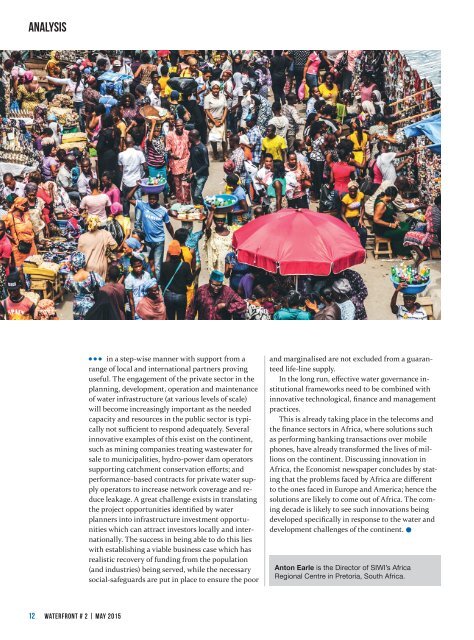Waterfront #2 2015: Always something new out of Africa
You also want an ePaper? Increase the reach of your titles
YUMPU automatically turns print PDFs into web optimized ePapers that Google loves.
ANALYSIS<br />
in a step-wise manner with support from a<br />
range <strong>of</strong> local and international partners proving<br />
useful. The engagement <strong>of</strong> the private sector in the<br />
planning, development, operation and maintenance<br />
<strong>of</strong> water infrastructure (at various levels <strong>of</strong> scale)<br />
will become increasingly important as the needed<br />
capacity and resources in the public sector is typically<br />
not sufficient to respond adequately. Several<br />
innovative examples <strong>of</strong> this exist on the continent,<br />
such as mining companies treating wastewater for<br />
sale to municipalities, hydro-power dam operators<br />
supporting catchment conservation efforts; and<br />
performance-based contracts for private water supply<br />
operators to increase network coverage and reduce<br />
leakage. A great challenge exists in translating<br />
the project opportunities identified by water<br />
planners into infrastructure investment opportunities<br />
which can attract investors locally and internationally.<br />
The success in being able to do this lies<br />
with establishing a viable business case which has<br />
realistic recovery <strong>of</strong> funding from the population<br />
(and industries) being served, while the necessary<br />
social-safeguards are put in place to ensure the poor<br />
and marginalised are not excluded from a guaranteed<br />
life-line supply.<br />
In the long run, effective water governance institutional<br />
frameworks need to be combined with<br />
innovative technological, finance and management<br />
practices.<br />
This is already taking place in the telecoms and<br />
the finance sectors in <strong>Africa</strong>, where solutions such<br />
as performing banking transactions over mobile<br />
phones, have already transformed the lives <strong>of</strong> millions<br />
on the continent. Discussing innovation in<br />
<strong>Africa</strong>, the Economist <strong>new</strong>spaper concludes by stating<br />
that the problems faced by <strong>Africa</strong> are different<br />
to the ones faced in Europe and America; hence the<br />
solutions are likely to come <strong>out</strong> <strong>of</strong> <strong>Africa</strong>. The coming<br />
decade is likely to see such innovations being<br />
developed specifically in response to the water and<br />
development challenges <strong>of</strong> the continent.<br />
Anton Earle is the Director <strong>of</strong> SIWI’s <strong>Africa</strong><br />
Regional Centre in Pretoria, S<strong>out</strong>h <strong>Africa</strong>.<br />
12 WATERFRONT # 2 | may <strong>2015</strong>


















